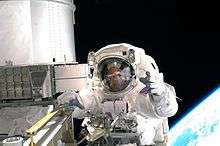Richard R. Arnold
| Richard Arnold | |
|---|---|
 | |
| NASA Astronaut | |
| Nationality | American |
| Status | Active |
| Born |
November 26, 1963 Cheverly, Maryland |
Other occupation | Teacher (High school, biology) |
Time in space | 12d 19h 29m |
| Selection | 2004 NASA Group 19 |
Total EVAs | 2 |
Total EVA time | 12h, 34m |
| Missions | STS-119 |
Mission insignia |
|
Richard Robert "Ricky" Arnold II (born November 26, 1963 in Cheverly, Maryland) is an American educator and a NASA astronaut. He flew on Space Shuttle mission STS-119, which launched March 15, 2009 and delivered the final set of solar arrays to the International Space Station.[1]
Arnold was raised in Bowie, Maryland and is married to Eloise Miller Arnold of Bowie. They have two daughters.
Education
- B.S., Accounting, Frostburg State University, Maryland, 1985.
-Brother of the Delta Beta Chi Fraternity
- Completed teacher certification program at Frostburg State University, Maryland, 1988.
- M.S., Marine, Estuarine, & Environmental Sciences, University of Maryland, 1992.
Organizations
- National Science Teachers Association
- International Technology Education Association
- National Council of Teachers of Mathematics.
Career
Arnold began working at the United States Naval Academy in 1987 as an Oceanographic Technician. Upon completing his teacher certification program, he accepted a position as a science teacher at John Hanson Middle School in Waldorf, Maryland. During his tenure, he completed a Masters program while conducting research in biostratigraphy at the Horn Point Environmental Laboratory in Cambridge, Maryland. Upon matriculation, Arnold spent another year working in the Marine Sciences including time at the Cape Cod National Seashore and aboard a sail training/oceanographic vessel headquartered in Woods Hole, Massachusetts. In 1993, Arnold joined the faculty at the Casablanca American School in Casablanca, Morocco, teaching college preparatory Biology and Marine Environmental Science. During that time, he began presenting workshops at various international education conferences focusing on science teaching methodologies. In 1996, he and his family moved to Riyadh, Saudi Arabia, where he was employed as a middle and high school science teacher at the American International School. In 2001, Arnold was hired by International Schools Services to teach middle school mathematics and science at the International School of Kuala Kencana operated by PT Freeport Indonesia in West Papua, Indonesia. In 2003, he accepted a similar teaching position at the American International School of Bucharest in Bucharest, Romania.
Arnold was the guest of honor at the Bowie High School Class of 2009 graduation, delivering the commencement speech.
NASA career

Arnold was selected as a Mission Specialist-Educator by NASA in May 2004. In February 2006 he completed Astronaut Candidate Training that included scientific and technical briefings, intensive instruction in Shuttle and International Space Station systems, physiological training, T-38 flight training, and water and wilderness survival training. Upon completion of his training, Arnold was assigned to the Hardware Integration Team in the Space Station Branch working on technical issues with JAXA hardware. He worked on various technical assignments until he was assigned to the STS-119 spaceflight. Arnold participated in two spacewalks during the mission.[2][3]
In August 2007, Arnold served as an aquanaut during the NEEMO 13 project, an exploration research mission held in Aquarius, the world's only undersea research laboratory.[4] On September 19, 2011, NASA announced that Arnold would participate in the NEEMO 15 mission in October 2011 from the DeepWorker submersible. The DeepWorker is a small submarine used as an underwater stand-in for the Space Exploration Vehicle, which might someday be used to explore the surface of an asteroid.[5]
References
![]() This article incorporates public domain material from websites or documents of the National Aeronautics and Space Administration.
This article incorporates public domain material from websites or documents of the National Aeronautics and Space Administration.
- ↑ NASA (2007). "NASA Assigns Crew for Final Solar Array Delivery to Station". NASA. Retrieved October 19, 2007.
- ↑ William Harwood for CBS News (March 19, 2009). "Spaceflight Now - STS-119 Shuttle Report - Spacewalkers bolt final power truss to the station". Spaceflight Now Inc. Retrieved January 12, 2012.
- ↑ NASA (March 23, 2009). "NASA - STS-119 MCC Status Report #16". NASA. Retrieved January 12, 2012.
- ↑ NASA (July 24, 2007). "NASA Announces Next Undersea Exploration Mission Dates and Crew". NASA. Retrieved September 26, 2011.
- ↑ NASA (September 19, 2011). "NASA - NASA Announces 15th Undersea Exploration Mission Date And Crew". NASA. Retrieved September 19, 2011.